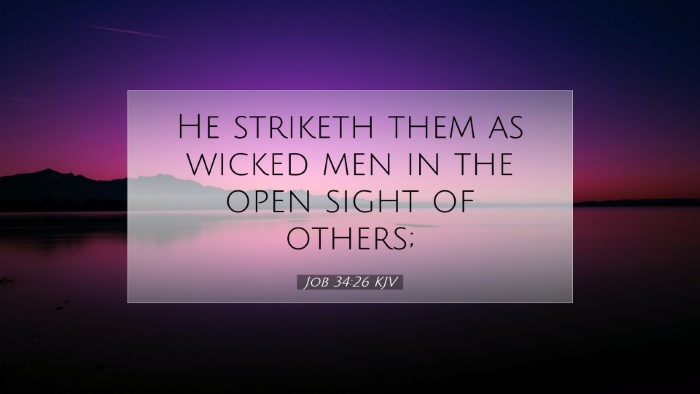Bible Commentary on Job 34:26
Verse Content: "He strikes them as wicked men in the open sight of others."
Introduction
The verse from Job 34:26 presents a profound reflection on the justice of God and the visible consequences of wickedness. In this commentary, we shall explore insights from classical scholars such as Matthew Henry, Albert Barnes, and Adam Clarke, synthesizing their thoughts into a cohesive understanding of this passage. This analysis aims to offer meaningful reflections for pastors, students, theologians, and scholars.
Textual Analysis
In the context of Job, Elihu, the speaker in this verse, seeks to remind Job of the nature of God as just and righteous. The assertion that God strikes the wicked openly highlights God's displeasure against sin and the ultimate accountability of individuals in the face of divine justice.
Matthew Henry's Commentary
According to Matthew Henry, this verse emphasizes the open punishment of the wicked, suggesting that God does not hide His judgment. He remarks that when God brings down the proud and the ungodly, it is often done in a public spectacle, serving both as a warning and as evidence of divine sovereignty. Henry notes that such displays serve to glorify God’s justice and righteousness, reinforcing the idea that evil cannot escape judgment.
- Public Punishment: The visibility of God's judgment serves to instill fear and reverence among the living.
- Justice of God: Henry stresses that God acts not merely in vengeance but in a way that promotes moral order in the universe.
Albert Barnes' Insights
Albert Barnes interprets this passage with an emphasis on the moral implications of wickedness in society. He highlights that God's actions against the wicked serve a dual purpose: punishment for the wrongdoer and a lesson for others who witness such divine wrath. Barnes articulates that such judgments reveal God's character as one who cannot overlook sin.
- Lesson for Witnesses: The punishment of the wicked serves as a deterrent for others who might be tempted to act similarly.
- Reflection of God’s Nature: God's judgment reinforces His moral attributes, emphasizing that divine justice is integral to His governance of the world.
Insights from Adam Clarke
Adam Clarke provides a deeper theological context for understanding the phrase "strikes them." He connects the striking mentioned in the verse not only with physical punishment but also with spiritual consequences. Clarke posits that the wicked are often struck with judgments that can manifest as societal collapse, loss of reputation, or even spiritual desolation.
- Spiritual Consequences: Clarke underlines that God's judgment can also pertain to the internal state of a person, resulting in despair or hardening of the heart.
- Holiness of God: The necessity of God's holiness demands that sin be addressed, which echoes throughout scriptural themes of justice.
Theological Implications
This passage raises essential theological considerations regarding the nature of sin, justice, and the provenience of suffering. Understanding the manner in which God addresses wickedness can inform various doctrinal positions, particularly concerning justice and mercy.
- God’s Justice: The text affirms that God's justice is both universal and particular, applying to all of humanity, regardless of status.
- The Role of Community: The public nature of judgment serves as a societal reminder that individual actions can have communal impacts, necessitating a collective moral responsibility.
Exhortations for Application
For those engaged in ministry and scholarship, the implications of Job 34:26 emphasize the need for a holistic view of God's character. As pastors and teachers, the understanding of God’s justice should lead to compassionate yet firm guidance towards righteousness.
- Preaching on Justice: It provides a framework for addressing themes of justice in sermons, facilitating a call to repentance among the congregation.
- Moral Integrity: It challenges individuals to live with integrity, mindful of the consequences of wicked actions both in this life and in eternity.
Conclusion
Job 34:26 serves as a vivid reminder of God's unwavering justice and the visible nature of divine judgment against wickedness. Insights from commentators deepen our understanding and challenge us to contemplate not only the nature of God but also our responses to sin in our lives and communities. The teachings gleaned from Henry, Barnes, and Clarke should inspire pastors, scholars, and laypersons alike to reflect on their moral conduct, encouraging a life lived in accordance with God’s will, demonstrating His glory through faithfulness to His righteous standards.


